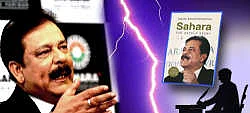Law Suits Of The Rich & Famous
Why has Subrata Roy slapped a Rs 200 crore defamation suit against a Mint journalist?


Support Independent Media
The media must be free and fair, uninfluenced by corporate or state interests. That's why you, the public, need to pay to keep news free.
ContributeI do not agree with what you have to say, but I’ll defend to the death your right to say it. – Voltaire
Sahara Shri Subrata Roy evidently is not a big fan of Voltaire. Last month, the Sahara Group – of which Roy is the “managing worker” – filed a Rs 200 crore defamation suit against journalist Tamal Bandyopadhyay for writing a book on the company and Roy without permission. According to the lawsuit filed on December 10, 2013 in the Calcutta High Court, in Bandyopadhyay’s book Sahara: The Untold Story, “incredible tales abound about Sahara” which could not be “substantiated”. Following which, the Calcutta High Court on December 23 ruled that “prima facie, the impugned materials do show the plaintiffs in poor light” and “the balance of convenience lies in restraining its publication”.
This is not the first time that Bandyopadhyay, Deputy Managing Editor with Mint, has written about the Sahara Group. He had earlier reported extensively on the Sahara Group’s stand-offs with the Securities Exchange Board of India (SEBI) and the Reserve Bank of India. Neither of those reports went down too well with the conglomerate. A libel suit was filed against some reporters and Mint’s editor in 2002 for the newspaper’s coverage of the company’s disputes with SEBI.
The book – excerpts of which can be read here – distinctly borrows from Bandyopadhyay’s research from when he had reported on the Sahara-SEBI stand-off. Interestingly, Subrata Roy seems to have initially co-operated with Bandyopadhyay and had even given the author an interview in January 2013. An interview in which he explained how he was being unfairly hounded since Sahara was an unlisted company and didn’t fall under the purview of SEBI. In the interview published in Mint, Roy claimed he had “never done one wrong thing in my life”.
The Indian media has thrown its weight behind Bandyopadhyay, with many journalists vouching for his personal integrity and journalistic ethics. In a tersely worded piece, Firstpost’s Editor-in-Chief R Jagannathan, condemned Sahara’s decision to sue Bandyopadhyay. “Muzzling authors and journalists is the oldest trick in the book for corporate groups and it is indeed surprising that a high court can grant an ex parte stay when the highest court in the land has made a series of negative comments on the Group that go well beyond what any journalist may want to say about Subrata Roy’s Sahara Group”.
Sahara Shri of course is not the first and won’t be the last business tycoon to take legal recourse against authors and journalists who don’t write flatteringly on them. The Polyester Prince: The Rise of Dhirubhai Ambani – a non-fiction narrative of the rise of Dhirubhai Ambani – was allowed to be released in India only after portions were edited out. The Indian Institute of Planning and Management has time and again bullied publications into submission with defamation suits of staggering amounts filed at obscure locations.
R Sukumar, editor of Mint, had this to say – “Anybody with some sort of public life is uncomfortable with anything negative written about them. People are more uncomfortable with books because of their permanent nature as opposed to reports in the web and newspaper which have a temporary shelf life”.
Our attempts to understand Sahara’s rationale-behind filing a Rs 200crore libel suit was an exercise in futility as the Group’s corporate communications department refused to respond to our multiple phone calls.
Today, with increasing corporate control over the media in the country, there is trepidation that news might not get reported the way it should be owing to pressure from owners. Which is why attempts at no-holds barred journalism are important. Just this week, Bloomsbury withdrew Air India’s “top honcho” Jitender Bhargava’s book The Descent of Air India. Bloomsbury even agreed “to destroy copies of the book left in its stocks and tendered an apology to former civil aviation minister Praful Patel, who has been pilloried in the book as the man who caused the downfall of the airline”. This was after a criminal defamation case was filed against Bhargava and Bloomsbury in Mumbai by Patel’s lawyer.
Muzzling of the media and any dissenting voice seems to be par for the course for the rich and powerful. It’s not just in India that writers are muzzled. Kitty Kelly, known for writing best-selling unauthorised biographies, was famously sued by Frank Sinatra before she even wrote the first word of her book on him. What our high and mighty don’t realise is that by trying to ban books on themselves, they only result in publicising the book. Which bodes well for Bandyopadhyay and the sales of his book, Sahara: The Untold Story.


Power NL-TNM Election Fund
General elections are around the corner, and Newslaundry and The News Minute have ambitious plans together to focus on the issues that really matter to the voter. From political funding to battleground states, media coverage to 10 years of Modi, choose a project you would like to support and power our journalism.
Ground reportage is central to public interest journalism. Only readers like you can make it possible. Will you?
